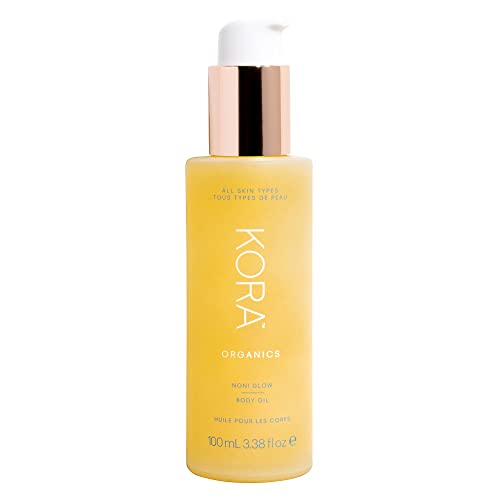
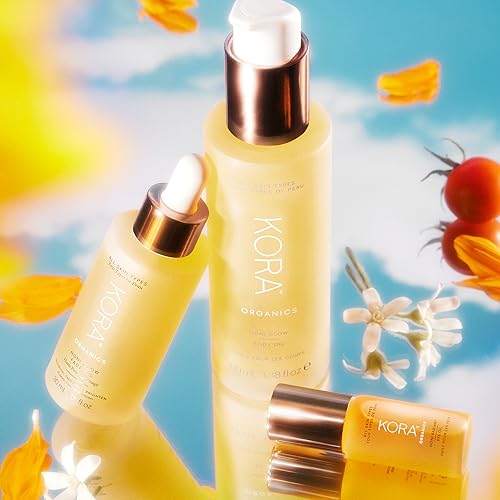

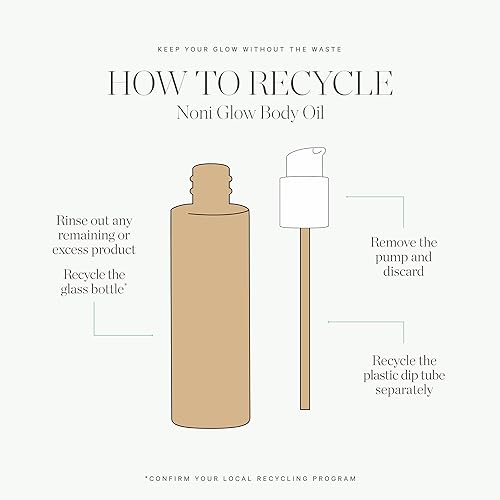
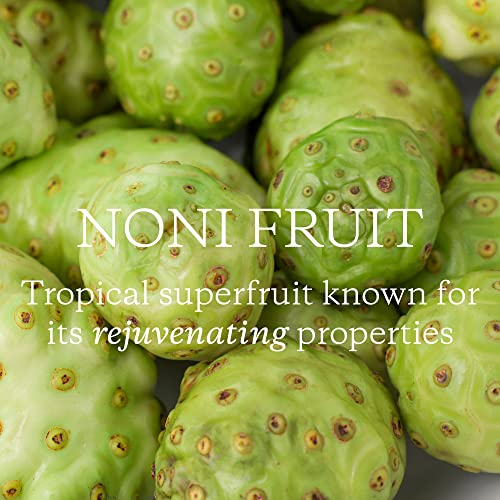
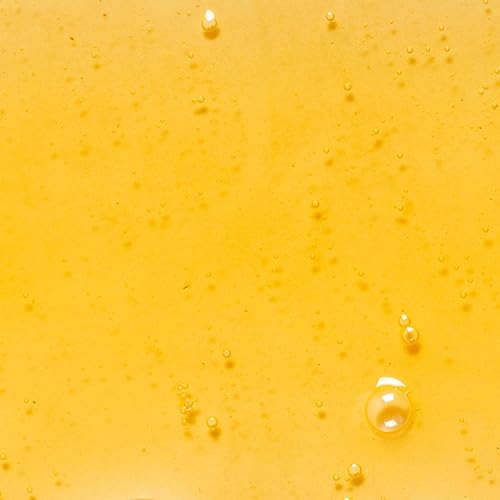
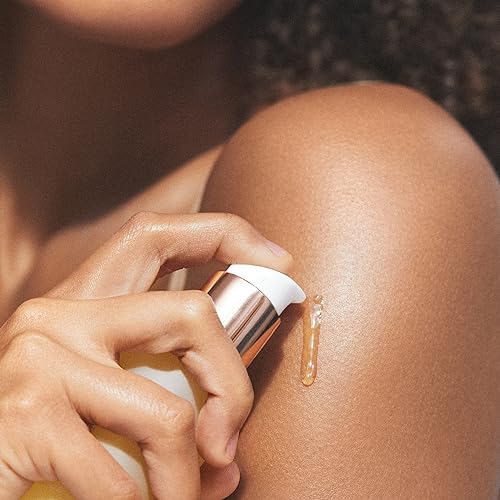
KORA Organics Body Oil - Nourishes & Smooths Skin, Certified Organic & Cruelty Free - 3.38oz


Pelargonium Graveolens (Geranium) Flower Oil
High RiskPelargonium graveolens (geranium) flower oil is a volatile essential oil extracted from the leaves and stems of the Pelargonium graveolens plant. It is commonly used in cosmetics for its fragrance and potential skin benefits. This oil is characterized by its floral scent and is often included in formulations for aromatherapy, skincare, and personal care products.
Sustai Insights
Pelargonium graveolens flower oil offers functional benefits such as fragrance enhancement in cosmetic formulations. However, it has a high allergenic potential, posing risks of skin irritation and sensitization. Environmental concerns include its potential as a pollutant, though it is not bioaccumulative. Regulatory bodies do not currently restrict its use, but safety assessments are essential due to its allergenic properties. Overall, the ingredient carries a high risk level, necessitating cautious use, especially for sensitive populations. Alternatives such as synthetic fragrance compounds may mitigate allergenic risks.
Citral
High RiskCitral is a naturally occurring scent ingredient primarily used for its lemon-like fragrance in various products, including perfumes, cosmetics, and food. It is derived from essential oils such as lemon myrtle and lemongrass.
Sustai Insights
Citral offers functional benefits as a fragrance component, enhancing product appeal. However, it is associated with a high risk of allergy and irritation, particularly affecting the skin, eyes, and respiratory system. While its carcinogenicity and reproductive toxicity concerns are low, citral's environmental impact as a potential irritant raises caution. Regulatory bodies note usage restrictions due to its allergenic potential, leading to an overall high-risk assessment. Safe practices include patch testing for allergies, and alternatives such as synthetic fragrances may offer lower irritation risks.
Geraniol
High RiskGeraniol is a naturally occurring scent ingredient commonly found in essential oils from plants such as geraniums and lemongrass. It is primarily used for its pleasant floral aroma in perfumes, cosmetics, and household products.
Sustai Insights
Geraniol serves as a fragrance component and offers a natural option for scenting products. However, it has a high allergenic potential and may cause skin irritation in sensitive individuals. While it is considered low risk for carcinogenicity and reproductive toxicity, regulatory bodies have placed restrictions on its use due to allergenic concerns. Overall, the assessment reflects a high-risk level, particularly for those prone to allergies, highlighting the need for caution in its application.
Citronellol
High RiskCitronellol is a naturally occurring scent ingredient commonly found in various essential oils. It is primarily used for its aromatic properties in perfumes, cosmetics, and household products, contributing to fragrance profiles.
Sustai Insights
Citronellol serves as a fragrance component, enhancing product appeal. However, it has a high allergenic potential, posing risks of skin irritation and sensitization. Environmental concerns include contamination risks. Regulatory bodies have restrictions on its use, emphasizing caution. Overall, citronellol presents a high risk regarding health and safety, warranting careful consideration in product formulations.
Rosa Damascena (Rose) Flower Oil
High RiskRosa damascena (rose) flower oil is an essential oil derived from the petals of the rose plant. It is commonly used in cosmetic formulations for its fragrance and potential skin-soothing properties. The oil is often included in perfumes, creams, and other personal care products for its aromatic qualities.
Sustai Insights
Rosa damascena (rose) flower oil offers functional benefits such as providing fragrance and potential skin-soothing effects. However, it has a high allergenic potential, posing risks of irritation and sensitization, particularly for sensitive individuals. Environmentally, it presents low risks, with no significant pollutant or bioaccumulation concerns. Regulatory status is marked with some restrictions under the EU cosmetics directive. Overall, the ingredient is assessed as high risk due to its allergenic properties, highlighting the need for caution in usage, particularly among vulnerable populations. Alternatives include synthetic fragrances or less allergenic floral oils.
Linalool
High RiskLinalool is a terpene commonly found in various plants, particularly in lavender and mint. It is primarily used in products for its fragrance and potential antimicrobial properties. Linalool is also utilized in formulations for its ability to enhance the sensory experience of personal care and household products.
Sustai Insights
Linalool offers functional benefits as a naturally occurring fragrance component and may exhibit antimicrobial properties. However, it presents high allergenic potential, with concerns about skin irritation and sensitization. Environmental risks include contamination issues, though it is not classified as a persistent pollutant. Regulatory bodies have noted the need for careful handling due to its allergenic nature. Overall, despite some beneficial attributes, the ingredient carries a high risk profile, warranting cautious use and consideration of safer alternatives.
Limonene
Medium RiskLimonene is a scent ingredient and solvent naturally found in citrus fruits, commonly used in personal care and cleaning products for its fragrant properties. It serves as a flavoring agent and enhances the overall sensory experience of products.
Sustai Insights
Limonene offers functional benefits such as acting as a solvent and fragrance enhancer. However, it carries a high allergenic potential, which can trigger skin or respiratory sensitivities in some individuals. Environmental concerns include moderate persistence and bioaccumulation, along with potential ecotoxicity. Regulatory restrictions necessitate verification in products containing this ingredient. Overall, the risk level is assessed as medium, emphasizing the importance of cautious use, particularly for sensitive populations. Safer alternatives may be considered to mitigate these risks.
Rosa Canina (Dog Rose) Seed Oil
Low RiskRosa canina seed oil, derived from the seeds of the dog rose plant, is a fixed oil known for its moisturizing properties. It is often used in cosmetic formulations to enhance skin hydration and improve texture, functioning primarily as an emollient.
Sustai Insights
Rosa canina seed oil offers functional benefits as a moisturizer, providing hydration and enhancing skin texture. It is sustainably sourced with low environmental impact. Health risks are minimal, with low concerns regarding carcinogenicity, allergens, and reproductive toxicity. No significant environmental hazards have been identified, and it is compliant with existing regulations. Overall, the risk level is considered low. Safe usage practices include patch testing, and while alternatives exist, such as jojoba oil, they may not replicate the unique properties of rosa canina seed oil.
Glycine Soja (Soybean) Oil
Low RiskGlycine soja (soybean) oil is derived from the seeds of the soybean plant and is commonly used in cosmetic formulations for its emollient properties. It functions as a moisturizer and skin conditioning agent, enhancing the texture and feel of products.
Sustai Insights
Glycine soja (soybean) oil offers functional benefits such as effective skin moisturization and conditioning. It is generally recognized as low-risk for health concerns, with minimal allergenic potential and no significant environmental hazards reported. Regulatory bodies have not imposed restrictions on its use. Overall, this ingredient is assessed as low risk, making it a suitable option for various cosmetic applications.
Dicaprylyl Carbonate
Low RiskDicaprylyl carbonate is a diester of carbonic acid, commonly used in cosmetic formulations as an emollient and skin-conditioning agent. It enhances the texture and feel of products, providing a light, non-greasy finish while helping to dissolve and stabilize other ingredients.
Sustai Insights
Dicaprylyl carbonate offers effective emollient properties, improving product aesthetics and skin feel. It presents a low risk for health concerns like carcinogenicity, allergies, or irritation. Environmentally, it shows low bioaccumulation potential and is not a significant pollutant. Regulatory bodies do not impose notable restrictions on its use. Overall, it is considered low risk, making it a safe choice for cosmetic applications.
Morinda Citrifolia Fruit Extract
Low RiskMorinda citrifolia fruit extract is an extract derived from the fruit of the Morinda citrifolia plant, commonly known as noni. It is utilized in various applications for its potential health benefits and functional properties in products.
Sustai Insights
Morinda citrifolia fruit extract offers functional benefits like antioxidant properties and supports skin health. It is sustainably sourced and biodegradable. Health risks are low, with no significant concerns regarding carcinogenicity, allergies, or reproductive toxicity. Environmental risks are minimal, as it does not bioaccumulate or contribute to pollution. Regulatory status is clear, with no significant restrictions. Overall, it is assessed as low risk, with safe usage practices encouraged. Alternatives may include other botanical extracts with similar properties.
Hippophae Rhamnoides (Sea Buckthorn) Oil
Low RiskHippophae rhamnoides oil, commonly known as sea buckthorn oil, is a fixed oil extracted from the berries of the sea buckthorn plant. It is primarily used in cosmetic formulations for its moisturizing and skin-nourishing properties, often incorporated for its fatty acid profile and antioxidant content.
Sustai Insights
Hippophae rhamnoides oil offers functional benefits such as skin hydration and potential antioxidant effects, contributing to improved skin health. It is sustainably sourced and biodegradable. The ingredient is associated with low health risks, including minimal concerns for carcinogenicity, allergies, and reproductive toxicity. Environmental risks are also low, with no significant pollutant or bioaccumulation potential identified. Regulatory status indicates no severe restrictions. Overall, this ingredient is assessed as low risk and safe for use in cosmetic products, with no specific safer alternatives readily available.
Punica Granatum (Pomegranate) Seed Oil
Low RiskPunica granatum (pomegranate) seed oil is derived from the seeds of the pomegranate fruit. It serves primarily as a moisturizer and emollient in cosmetic formulations, contributing to skin hydration and texture improvement. The oil is rich in fatty acids and antioxidants, enhancing its functional properties in personal care products.
Sustai Insights
Punica granatum (pomegranate) seed oil offers functional benefits as a moisturizer and potential antioxidant. It is generally considered low risk for cancer, allergies, and reproductive toxicity, while contamination concerns are noted as low to moderate. Regulatory assessments do not impose significant restrictions on its use. Environmental impacts are minimal, and it is not classified as bioaccumulative. Safe usage practices are recommended, and alternatives may include other plant-based oils. Overall, the ingredient is assessed as low risk based on current scientific consensus.
Tocopherol
Low RiskTocopherols are a class of naturally occurring compounds, primarily known for their role as antioxidants. They are commonly used in cosmetic and skincare products to help stabilize formulations and protect ingredients from oxidative damage.
Sustai Insights
Tocopherols provide functional benefits such as antioxidant protection and skin conditioning. They are generally recognized as safe, with low concerns regarding carcinogenicity, allergies, and reproductive toxicity. However, enhanced skin absorption and potential endocrine disruption are noted. Regulatory bodies have not imposed significant restrictions on tocopherols, categorizing the overall risk as low. Safe usage practices should be observed, and while alternatives exist, tocopherols remain a viable option in formulations.
Helianthus Annuus (Sunflower) Seed Oil
Low RiskHelianthus annuus (sunflower) seed oil is derived from the seeds of the sunflower plant. It serves primarily as an emollient and moisturizer in cosmetic formulations, helping to maintain skin hydration and improve texture.
Sustai Insights
Sunflower seed oil is effective as an emollient, providing moisture and improving skin texture while being biodegradable and sustainably sourced. It poses low health risks, including negligible concerns for carcinogenicity, allergies, or reproductive toxicity. Environmentally, it does not significantly contribute to pollution or bioaccumulation. Regulatory bodies currently do not list any advisories for this ingredient. Overall, it is assessed as low risk, with safe usage practices recommended. Alternatives include oils like jojoba or almond oil for those seeking different properties.
Rosa Canina (Dog Rose) Seed Oil
Low RiskRosa canina seed oil, derived from the seeds of the dog rose plant, is a fixed oil known for its moisturizing properties. It is often used in cosmetic formulations to enhance skin hydration and improve texture, functioning primarily as an emollient.
Sustai Insights
Rosa canina seed oil offers functional benefits as a moisturizer, providing hydration and enhancing skin texture. It is sustainably sourced with low environmental impact. Health risks are minimal, with low concerns regarding carcinogenicity, allergens, and reproductive toxicity. No significant environmental hazards have been identified, and it is compliant with existing regulations. Overall, the risk level is considered low. Safe usage practices include patch testing, and while alternatives exist, such as jojoba oil, they may not replicate the unique properties of rosa canina seed oil.
Pelargonium Graveolens (Geranium) Flower Oil
High RiskPelargonium graveolens (geranium) flower oil is a volatile essential oil extracted from the leaves and stems of the Pelargonium graveolens plant. It is commonly used in cosmetics for its fragrance and potential skin benefits. This oil is characterized by its floral scent and is often included in formulations for aromatherapy, skincare, and personal care products.
Sustai Insights
Pelargonium graveolens flower oil offers functional benefits such as fragrance enhancement in cosmetic formulations. However, it has a high allergenic potential, posing risks of skin irritation and sensitization. Environmental concerns include its potential as a pollutant, though it is not bioaccumulative. Regulatory bodies do not currently restrict its use, but safety assessments are essential due to its allergenic properties. Overall, the ingredient carries a high risk level, necessitating cautious use, especially for sensitive populations. Alternatives such as synthetic fragrance compounds may mitigate allergenic risks.
Citral
High RiskCitral is a naturally occurring scent ingredient primarily used for its lemon-like fragrance in various products, including perfumes, cosmetics, and food. It is derived from essential oils such as lemon myrtle and lemongrass.
Sustai Insights
Citral offers functional benefits as a fragrance component, enhancing product appeal. However, it is associated with a high risk of allergy and irritation, particularly affecting the skin, eyes, and respiratory system. While its carcinogenicity and reproductive toxicity concerns are low, citral's environmental impact as a potential irritant raises caution. Regulatory bodies note usage restrictions due to its allergenic potential, leading to an overall high-risk assessment. Safe practices include patch testing for allergies, and alternatives such as synthetic fragrances may offer lower irritation risks.
Geraniol
High RiskGeraniol is a naturally occurring scent ingredient commonly found in essential oils from plants such as geraniums and lemongrass. It is primarily used for its pleasant floral aroma in perfumes, cosmetics, and household products.
Sustai Insights
Geraniol serves as a fragrance component and offers a natural option for scenting products. However, it has a high allergenic potential and may cause skin irritation in sensitive individuals. While it is considered low risk for carcinogenicity and reproductive toxicity, regulatory bodies have placed restrictions on its use due to allergenic concerns. Overall, the assessment reflects a high-risk level, particularly for those prone to allergies, highlighting the need for caution in its application.
Glycine Soja (Soybean) Oil
Low RiskGlycine soja (soybean) oil is derived from the seeds of the soybean plant and is commonly used in cosmetic formulations for its emollient properties. It functions as a moisturizer and skin conditioning agent, enhancing the texture and feel of products.
Sustai Insights
Glycine soja (soybean) oil offers functional benefits such as effective skin moisturization and conditioning. It is generally recognized as low-risk for health concerns, with minimal allergenic potential and no significant environmental hazards reported. Regulatory bodies have not imposed restrictions on its use. Overall, this ingredient is assessed as low risk, making it a suitable option for various cosmetic applications.
Dicaprylyl Carbonate
Low RiskDicaprylyl carbonate is a diester of carbonic acid, commonly used in cosmetic formulations as an emollient and skin-conditioning agent. It enhances the texture and feel of products, providing a light, non-greasy finish while helping to dissolve and stabilize other ingredients.
Sustai Insights
Dicaprylyl carbonate offers effective emollient properties, improving product aesthetics and skin feel. It presents a low risk for health concerns like carcinogenicity, allergies, or irritation. Environmentally, it shows low bioaccumulation potential and is not a significant pollutant. Regulatory bodies do not impose notable restrictions on its use. Overall, it is considered low risk, making it a safe choice for cosmetic applications.
Morinda Citrifolia Fruit Extract
Low RiskMorinda citrifolia fruit extract is an extract derived from the fruit of the Morinda citrifolia plant, commonly known as noni. It is utilized in various applications for its potential health benefits and functional properties in products.
Sustai Insights
Morinda citrifolia fruit extract offers functional benefits like antioxidant properties and supports skin health. It is sustainably sourced and biodegradable. Health risks are low, with no significant concerns regarding carcinogenicity, allergies, or reproductive toxicity. Environmental risks are minimal, as it does not bioaccumulate or contribute to pollution. Regulatory status is clear, with no significant restrictions. Overall, it is assessed as low risk, with safe usage practices encouraged. Alternatives may include other botanical extracts with similar properties.
Hippophae Rhamnoides (Sea Buckthorn) Oil
Low RiskHippophae rhamnoides oil, commonly known as sea buckthorn oil, is a fixed oil extracted from the berries of the sea buckthorn plant. It is primarily used in cosmetic formulations for its moisturizing and skin-nourishing properties, often incorporated for its fatty acid profile and antioxidant content.
Sustai Insights
Hippophae rhamnoides oil offers functional benefits such as skin hydration and potential antioxidant effects, contributing to improved skin health. It is sustainably sourced and biodegradable. The ingredient is associated with low health risks, including minimal concerns for carcinogenicity, allergies, and reproductive toxicity. Environmental risks are also low, with no significant pollutant or bioaccumulation potential identified. Regulatory status indicates no severe restrictions. Overall, this ingredient is assessed as low risk and safe for use in cosmetic products, with no specific safer alternatives readily available.
Citronellol
High RiskCitronellol is a naturally occurring scent ingredient commonly found in various essential oils. It is primarily used for its aromatic properties in perfumes, cosmetics, and household products, contributing to fragrance profiles.
Sustai Insights
Citronellol serves as a fragrance component, enhancing product appeal. However, it has a high allergenic potential, posing risks of skin irritation and sensitization. Environmental concerns include contamination risks. Regulatory bodies have restrictions on its use, emphasizing caution. Overall, citronellol presents a high risk regarding health and safety, warranting careful consideration in product formulations.
Punica Granatum (Pomegranate) Seed Oil
Low RiskPunica granatum (pomegranate) seed oil is derived from the seeds of the pomegranate fruit. It serves primarily as a moisturizer and emollient in cosmetic formulations, contributing to skin hydration and texture improvement. The oil is rich in fatty acids and antioxidants, enhancing its functional properties in personal care products.
Sustai Insights
Punica granatum (pomegranate) seed oil offers functional benefits as a moisturizer and potential antioxidant. It is generally considered low risk for cancer, allergies, and reproductive toxicity, while contamination concerns are noted as low to moderate. Regulatory assessments do not impose significant restrictions on its use. Environmental impacts are minimal, and it is not classified as bioaccumulative. Safe usage practices are recommended, and alternatives may include other plant-based oils. Overall, the ingredient is assessed as low risk based on current scientific consensus.
Rosa Damascena (Rose) Flower Oil
High RiskRosa damascena (rose) flower oil is an essential oil derived from the petals of the rose plant. It is commonly used in cosmetic formulations for its fragrance and potential skin-soothing properties. The oil is often included in perfumes, creams, and other personal care products for its aromatic qualities.
Sustai Insights
Rosa damascena (rose) flower oil offers functional benefits such as providing fragrance and potential skin-soothing effects. However, it has a high allergenic potential, posing risks of irritation and sensitization, particularly for sensitive individuals. Environmentally, it presents low risks, with no significant pollutant or bioaccumulation concerns. Regulatory status is marked with some restrictions under the EU cosmetics directive. Overall, the ingredient is assessed as high risk due to its allergenic properties, highlighting the need for caution in usage, particularly among vulnerable populations. Alternatives include synthetic fragrances or less allergenic floral oils.
Limonene
Medium RiskLimonene is a scent ingredient and solvent naturally found in citrus fruits, commonly used in personal care and cleaning products for its fragrant properties. It serves as a flavoring agent and enhances the overall sensory experience of products.
Sustai Insights
Limonene offers functional benefits such as acting as a solvent and fragrance enhancer. However, it carries a high allergenic potential, which can trigger skin or respiratory sensitivities in some individuals. Environmental concerns include moderate persistence and bioaccumulation, along with potential ecotoxicity. Regulatory restrictions necessitate verification in products containing this ingredient. Overall, the risk level is assessed as medium, emphasizing the importance of cautious use, particularly for sensitive populations. Safer alternatives may be considered to mitigate these risks.
Linalool
High RiskLinalool is a terpene commonly found in various plants, particularly in lavender and mint. It is primarily used in products for its fragrance and potential antimicrobial properties. Linalool is also utilized in formulations for its ability to enhance the sensory experience of personal care and household products.
Sustai Insights
Linalool offers functional benefits as a naturally occurring fragrance component and may exhibit antimicrobial properties. However, it presents high allergenic potential, with concerns about skin irritation and sensitization. Environmental risks include contamination issues, though it is not classified as a persistent pollutant. Regulatory bodies have noted the need for careful handling due to its allergenic nature. Overall, despite some beneficial attributes, the ingredient carries a high risk profile, warranting cautious use and consideration of safer alternatives.
Tocopherol
Low RiskTocopherols are a class of naturally occurring compounds, primarily known for their role as antioxidants. They are commonly used in cosmetic and skincare products to help stabilize formulations and protect ingredients from oxidative damage.
Sustai Insights
Tocopherols provide functional benefits such as antioxidant protection and skin conditioning. They are generally recognized as safe, with low concerns regarding carcinogenicity, allergies, and reproductive toxicity. However, enhanced skin absorption and potential endocrine disruption are noted. Regulatory bodies have not imposed significant restrictions on tocopherols, categorizing the overall risk as low. Safe usage practices should be observed, and while alternatives exist, tocopherols remain a viable option in formulations.
Helianthus Annuus (Sunflower) Seed Oil
Low RiskHelianthus annuus (sunflower) seed oil is derived from the seeds of the sunflower plant. It serves primarily as an emollient and moisturizer in cosmetic formulations, helping to maintain skin hydration and improve texture.
Sustai Insights
Sunflower seed oil is effective as an emollient, providing moisture and improving skin texture while being biodegradable and sustainably sourced. It poses low health risks, including negligible concerns for carcinogenicity, allergies, or reproductive toxicity. Environmentally, it does not significantly contribute to pollution or bioaccumulation. Regulatory bodies currently do not list any advisories for this ingredient. Overall, it is assessed as low risk, with safe usage practices recommended. Alternatives include oils like jojoba or almond oil for those seeking different properties.
Discover the transformative power of KORA Organics Noni Glow Body Oil, a luxurious, lightweight body oil designed to nourish and smooth your skin. This certified organic, cruelty-free formula is perfect for environmentally and health-conscious consumers seeking effective hydration without harmful additives.
- Deep Hydration: A blend of organic Noni Extract, Rosehip, and Sunflower Seed Oils locks in moisture, leaving skin beautifully radiant and hydrated.
- Natural Ingredients: Enriched with antioxidants and essential fatty acids, this body oil promotes healthy skin while being free from artificial fragrances and colors.
- Easy Application: Warm a few drops in your hands and massage onto clean, dry skin for optimal absorption. Ideal for use after showering.
- Versatile Use: Perfect for daily use, targeting dry areas for a smooth and glowing finish, enhancing your skin's natural radiance.
- Commitment to Quality: KORA Organics emphasizes sustainability and ethical practices, ensuring you support a brand that cares for both your skin and the planet.
Subscribe & Save with Sustai
- Best Price Guarantee: Always enjoy the lowest prices on sustainable home essentials.
- No Surprises: We’ll notify you before shipping. No hidden fees, ever.
- You’re in Charge: Change, pause, or cancel your subscription anytime with ease.
- Eco-Friendly Deliveries: Our grouped shipments mean less packaging and lower emissions.
Join us on a sustainable journey. Special offers for a limited time! Prices and promotions may change.
Recommended Products
Discover the transformative power of KORA Organics Noni Glow Body Oil, a luxurious, lightweight body oil designed to nourish and smooth your skin. This certified organic, cruelty-free formula is perfect for environmentally and health-conscious consumers seeking effective hydration without harmful additives.
- Deep Hydration: A blend of organic Noni Extract, Rosehip, and Sunflower Seed Oils locks in moisture, leaving skin beautifully radiant and hydrated.
- Natural Ingredients: Enriched with antioxidants and essential fatty acids, this body oil promotes healthy skin while being free from artificial fragrances and colors.
- Easy Application: Warm a few drops in your hands and massage onto clean, dry skin for optimal absorption. Ideal for use after showering.
- Versatile Use: Perfect for daily use, targeting dry areas for a smooth and glowing finish, enhancing your skin's natural radiance.
- Commitment to Quality: KORA Organics emphasizes sustainability and ethical practices, ensuring you support a brand that cares for both your skin and the planet.

You can have at most 2 Sustainable Steals products in your cart
Customer Reviews
Customers’ View
Customers appreciate the nourishing and lightweight nature of KORA Organics Noni Glow Body Oil, noting its deep hydration and quick absorption without a greasy feel. Many highlight the clean, natural ingredients, including organic Noni Extract and Rosehip Oil, which align with their eco-friendly and health-conscious values. Users have expressed satisfaction with the subtle, pleasant scent, making it a luxurious addition to their skincare routine. Overall, customers find this body oil effective for enhancing skin radiance while feeling good about its cruelty-free and clean beauty credentials.
AI-generated from the text of customer reviewsThis product is rated 5.0 of 5.0 stars.
It has received 1 review.




